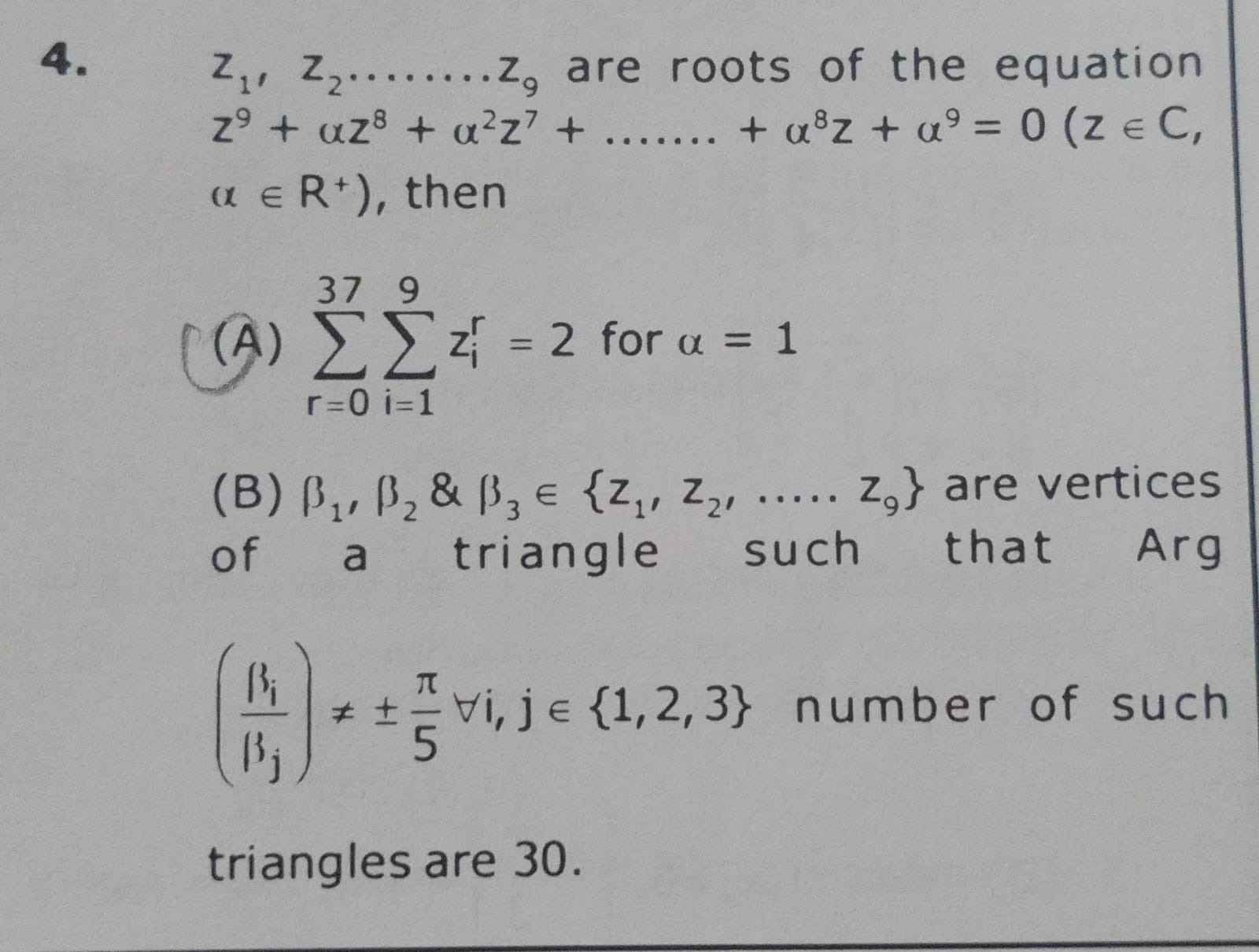Question
Question: $z_1, z_2,........z_9$ are roots of the equation $z^9 + \alpha z^8 + \alpha^2z^7 +........+ \alpha^...
z1,z2,........z9 are roots of the equation z9+αz8+α2z7+........+α8z+α9=0 (z∈C, α∈R+), then

∑r=037∑i=19zir=2 for α=1
β1,β2&β3∈{z1,z2,.....z9} are vertices of a triangle such that Arg(βjβi)=±5π∀i,j∈{1,2,3} number of such triangles are 30.
(A) ∑r=037∑i=19zir=2 for α=1
Solution
The roots of the equation z9+αz8+α2z7+⋯+α8z+α9=0 can be found by multiplying the equation by (z−α). This gives (z−α)(z9+αz8+⋯+α9)=z10−α10. So the equation is equivalent to z−αz10−α10=0. The roots are the solutions to z10−α10=0 except for z=α. The solutions to z10=α10 are z=αei102kπ=αei5kπ for k=0,1,…,9. The root z=α corresponds to k=0. Thus, the roots of the given equation are zk=αei5kπ for k=1,2,…,9.
Option (A): ∑r=037∑i=19zir=2 for α=1.
If α=1, the roots are zk=ei5kπ for k=1,2,…,9. Let ζ=eiπ/5. The roots are ζ1,ζ2,…,ζ9. For any root zi, we have zi10=(eikπ/5)10=ei2kπ=1 for k∈{1,…,9}. The inner sum is ∑r=037zir. This is a geometric series with first term 1, common ratio zi, and 38 terms. Since zi=1 (as k∈{1,…,9}), the sum is 1−zi1−zi38. Since zi10=1, zi38=zi3×10+8=(zi10)3zi8=13zi8=zi8. So, ∑r=037zir=1−zi1−zi8=1+zi+zi2+⋯+zi7. We need to compute ∑i=19(1+zi+⋯+zi7). Let zi=ζki where ki are distinct values from {1,2,…,9}. The sum is ∑k=19(1+ζk+ζ2k+⋯+ζ7k). This can be written as ∑k=191+∑k=19ζk+∑k=19ζ2k+⋯+∑k=19ζ7k. The first term is ∑k=191=9. For m∈{1,2,…,7}, consider the sum ∑k=19ζmk=∑k=19(ζm)k. Since m∈{1,2,…,7}, ζm=eimπ/5=1 because m/5 is not an integer multiple of 2. The sum of the 10th roots of unity is 1+ζm+ζ2m+⋯+ζ9m=∑k=09(ζm)k=1−ζm1−(ζm)10=1−ζm1−(ζ10)m=1−ζm1−1m=0. So, ∑k=19(ζm)k=(∑k=09(ζm)k)−(ζm)0=0−1=−1. This holds for m=1,2,…,7. The total sum is 9+∑m=17(−1)=9+7×(−1)=9−7=2. So, option (A) is correct.
Option (B): β1,β2,β3∈{z1,z2,…,z9} are vertices of a triangle such that Arg(βjβi)=±5π for all i,j∈{1,2,3} with i=j. Number of such triangles are 30.
Let βi=zki=αeikiπ/5 and βj=zkj=αeikjπ/5, where ki,kj∈{1,2,…,9} are distinct. Arg(βjβi)=Arg(αeikjπ/5αeikiπ/5)=Arg(ei(ki−kj)π/5)=(ki−kj)5π(mod2π). The condition is (ki−kj)5π(mod2π)=±5π. This means (ki−kj)/5(mod2)=±1/5. (ki−kj)/5=±1/5+2n for any integer n. ki−kj=±1+10n. Since ki,kj∈{1,2,…,9} are distinct, ki−kj is an integer from −8 to 8, excluding 0. The condition ki−kj=±1+10n for n∈Z. If n=0, the condition is ki−kj=±1. If n=0, ∣10n∣≥10. Since ∣ki−kj∣≤8, ki−kj cannot be equal to ±1+10n for n=0. So the condition simplifies to ∣ki−kj∣=1 for any distinct pair i,j∈{1,2,3}. This means that the indices k1,k2,k3 chosen from {1,2,…,9} must be such that no two indices are consecutive integers.
We need to choose 3 distinct indices k1<k2<k3 from the set S={1,2,…,9} such that k2−k1>1 and k3−k2>1. Let x1=k1, x2=k2−k1, x3=k3−k2, x4=9−k3. We have k1≥1, k2>k1+1, k3>k2+1. x1≥1. x2=k2−k1≥2. x3=k3−k2≥2. x4=9−k3≥9−(9)=0. (It's possible that k3=9) x1+x2+x3+x4=k1+(k2−k1)+(k3−k2)+(9−k3)=9. Let y1=x1−1≥0, y2=x2−2≥0, y3=x3−2≥0, y4=x4≥0. (y1+1)+(y2+2)+(y3+2)+y4=9. y1+y2+y3+y4=9−1−2−2=4. We need to find the number of non-negative integer solutions to y1+y2+y3+y4=4. This is a stars and bars problem. The number of solutions is (k−1n+k−1)=(4−14+4−1)=(37). (37)=3×2×17×6×5=35.
This is the number of ways to choose 3 indices k1<k2<k3 from {1,2,…,9} such that no two are consecutive. Each set of 3 indices corresponds to a unique triangle. The number of such triangles is 35. Option (B) states the number of such triangles is 30, which is incorrect.
